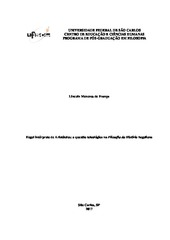| dc.contributor.author | França, Lincoln Menezes de | |
| dc.date.accessioned | 2018-01-29T18:28:41Z | |
| dc.date.available | 2018-01-29T18:28:41Z | |
| dc.date.issued | 2017-05-30 | |
| dc.identifier.citation | FRANÇA, Lincoln Menezes de. Hegel intérprete de Aristóteles : a questão teleológica na filosofia da história hegeliana. 2017. Tese (Doutorado em Filosofia) – Universidade Federal de São Carlos, São Carlos, 2017. Disponível em: https://repositorio.ufscar.br/handle/ufscar/9324. | * |
| dc.identifier.uri | https://repositorio.ufscar.br/handle/ufscar/9324 | |
| dc.description.abstract | For G.W.F. Hegel (1770-1831), the historical deployments demonstrate as a whole a progression in the recognition of the Self of the Spirit and the knowledge of freedom, which enables the philosophy of history to verify the effectiveness of reason in the world and the progressive achievement of the absolute ultimate End purpose. As Hegel considers that the conception of purpose is the main determination that arrives at us from the Aristotelian philosophy, the central objective of this thesis is to understand the role of the Aristotelian philosophy of the history of Hegel. The singularity of the Hegelian teleological conception is characterized by resorting to Aristotelian philosophy as a necessary moment for Hegel's reaction to Kantian and post-Kantian idealism, providing greater clarity about Hegel's understanding of the teleological question in history and its relation to its conception of the history of philosophy according to its own conceptual heritage. The analytical starting point of this thesis is the Phenomenology of the Spirit, a work in which Hegel develops the introduction to his philosophical system and also presents a peculiar teleological perspective, which is systematically exposed later in the texts of the Science of Logic and the Encyclopedia of Philosophical Sciences. These works of systematic character has a central importance for the understanding of the teleological question in the Lectures on the Philosophy of History, since they are deployments of their own philosophical system. In the Lectures on the History of Philosophy there is a more detailed exposition of Aristotelian philosophy and the teleological question. However, the philosophical problems faced by Hegel are specific to his time, which implies conceptual peculiarities concerning teleology in the Hegelian system and, consequently, in the Philosophy of History. In addition, Hegel has a very specific conception of the interpretation of the history of philosophy, linked to the systematic notion of the development of the Spirit. In this sense, by accepting a conceptual heritage in relation to Aristotelian teleology, Hegel searches one more internal coherence for his own systematic conception of the history of philosophy, in other words, one conception where there is a progression of the Spirit from which Aristotle and the other philosophers were part of it, rather than a philosophical fidelity or a strict conceptual affiliation to Aristotle. | eng |
| dc.description.sponsorship | Não recebi financiamento | por |
| dc.language.iso | por | por |
| dc.publisher | Universidade Federal de São Carlos | por |
| dc.rights.uri | Acesso aberto | por |
| dc.subject | Hegel | por |
| dc.subject | Aristóteles | por |
| dc.subject | Teleologia | por |
| dc.subject | História | por |
| dc.subject | Aristotle | eng |
| dc.subject | Teleology | eng |
| dc.subject | History | eng |
| dc.title | Hegel intérprete de Aristóteles : a questão teleológica na filosofia da história hegeliana | por |
| dc.type | Tese | por |
| dc.contributor.advisor1 | Baioni, José Eduardo Marques | |
| dc.contributor.advisor1Lattes | http://lattes.cnpq.br/9613180348313909 | por |
| dc.description.resumo | Para G. W. F. Hegel (1770-1831), os desdobramentos históricos demonstram em seu conjunto uma progressão no reconhecimento de Si do Espírito, do saber da liberdade, o que possibilita à filosofia da história constatar a efetividade da razão no mundo e a progressiva consecução do fim último absoluto. Como Hegel considera que a concepção de finalidade é a principal determinação que nos chega da filosofia aristotélica, o objetivo central desta tese é compreender o papel da filosofia aristotélica para a concepção de teleologia na filosofia da história de Hegel. A singularidade da concepção teleológica hegeliana caracteriza-se por recorrer à filosofia aristotélica como momento necessário à reação de Hegel em relação ao idealismo kantiano e pós-kantiano, propiciando maior clareza a respeito da compreensão hegeliana acerca da questão teleológica na história e sua relação com sua concepção da história da filosofia no que diz respeito à suas próprias heranças conceituais. O ponto de partida analítico desta tese é a Fenomenologia do Espírito, obra na qual Hegel desenvolve a introdução ao seu sistema filosófico e já apresenta uma perspectiva teleológica peculiar, que é sistematicamente exposta posteriormente nos textos da Ciência da Lógica e da Enciclopédia das Ciências Filosóficas. Essas obras de caráter sistemático têm importância central para a compreensão da questão teleológica nas Lições sobre a Filosofia da História, já que essas são desdobramentos do seu próprio sistema filosófico. Nas Lições sobre a História da Filosofia há uma exposição mais detalhada da filosofia aristotélica e da questão teleológica. Contudo, os problemas filosóficos enfrentados por Hegel são específicos de seu tempo, o que implica tratar de peculiaridades conceituais concernentes à teleologia no sistema hegeliano e, consequentemente, na Filosofia da História. Além disso, Hegel tem uma concepção muito própria de interpretação da história da filosofia, vinculada à noção sistemática de desenvolvimento do Espírito. Nesse sentido, ao admitir uma herança conceitual em relação à teleologia aristotélica, Hegel busca mais uma coerência interna à própria concepção sistemática de história da filosofia, ou seja, a de que há uma progressão do Espírito da qual Aristóteles e os demais filósofos foram parte, do que propriamente uma fidelidade filosófica ou uma filiação conceitual estrita a Aristóteles. | por |
| dc.publisher.initials | UFSCar | por |
| dc.publisher.program | Programa de Pós-Graduação em Filosofia - PPGFil | por |
| dc.subject.cnpq | CIENCIAS HUMANAS::FILOSOFIA | por |
| dc.ufscar.embargo | Online | por |
| dc.publisher.address | Câmpus São Carlos | por |
| dc.contributor.authorlattes | http://lattes.cnpq.br/6566744119224225 | por |
